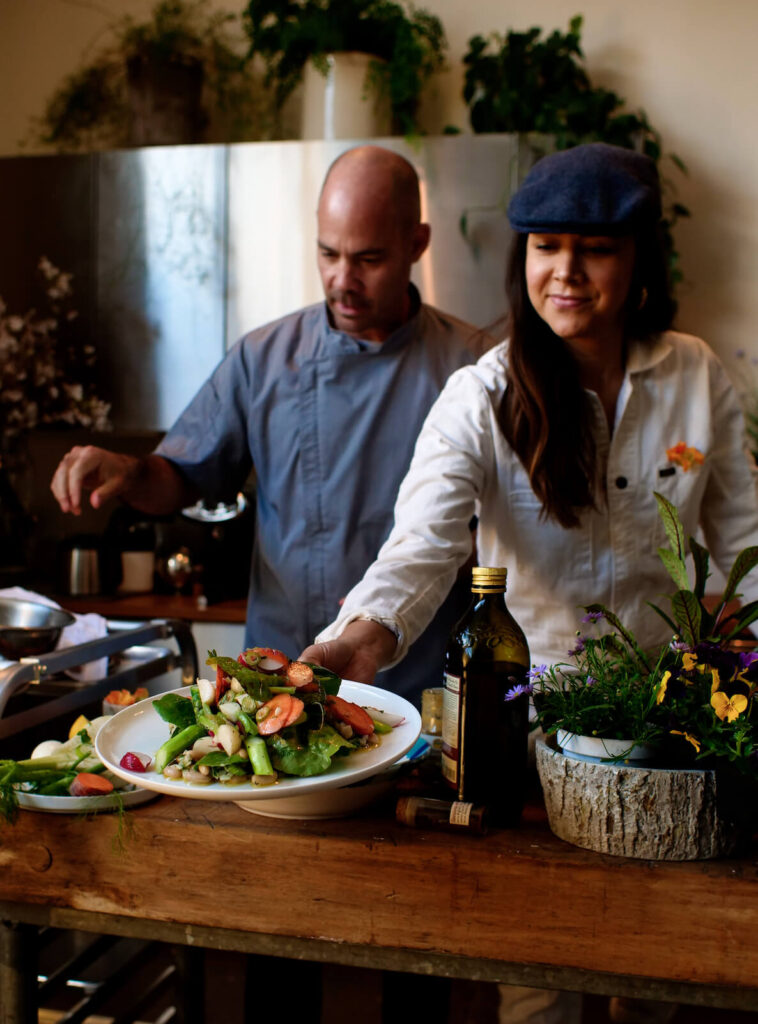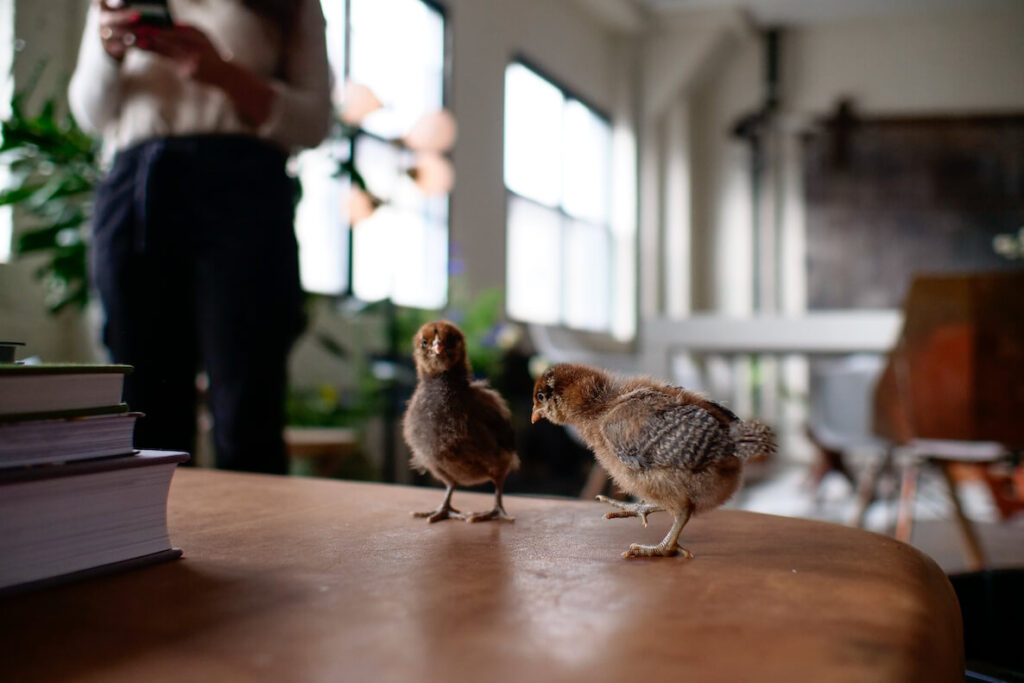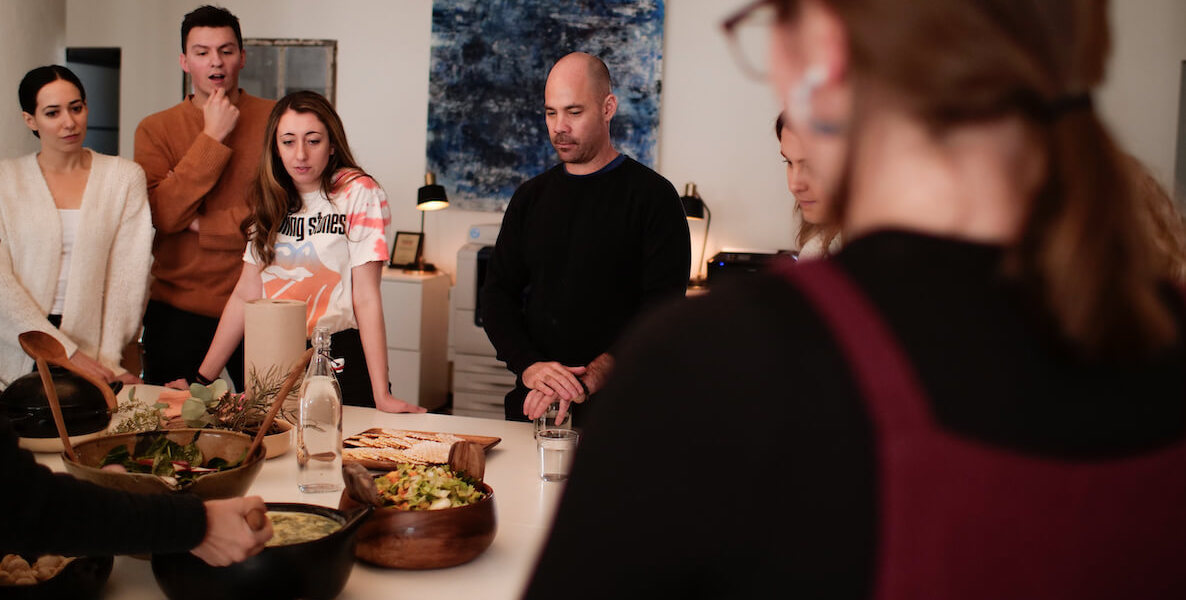Prior to the pandemic, you’d be likely to find more than a dozen staffers hunkered down at the sprawling, industrial-chic headquarters of the creative agency Cohere at 10th and Hamilton streets.

Now, with the city under quarantine, the only signs of life regularly buzzing around the office are Cohere founder Antoinette Marie Johnson and her business partner, chef Erik Oberholtzer.
Plus six baby chickens.
And… a hydroponic tower?
“One of our partners, Gardyn, sent it to us the first week of Covid-19, and it’s been astonishing to see,” Johnson says by phone one morning. “We’re harvesting arugula and baby gem lettuce!”
Say what now?
Allow us to explain.
Cohere may be a creative agency, but unlike other similar outfits in Philly—which are happy to take on any ol’ branding campaign or website design—Cohere has an at-once very niche and very grand focus: Making the world a better place.
The team is committed to taking on clients—in Philly, New York (where they have an office in Brooklyn), and elsewhere—who are committed to making the world better: organic farmers like Ashley Walsh of Pocono Organics; plant-based fast-casual chain HipCityVeg; zero-waste prepared foods like Simply Good Jars.
“I really believe in this model of investing in small businesses to help them be authentic to the stakeholders of the neighborhood or region, versus what gentrification can sometimes look like, which is big brands coming in with their spaceship Cheesecake Factories and plopping them on the street so that it suddenly feels like a suburban mall,” Johnson says.
![]() In urban planning circles, this philosophy is known as placemaking; Cohere’s version of it adds that commitment to doing good. And at a time when it feels like the world is crumbling, it just may be the secret to keeping agencies relevant, businesses thriving, and cities strong as we start to recover from the effects of Covid-19.
In urban planning circles, this philosophy is known as placemaking; Cohere’s version of it adds that commitment to doing good. And at a time when it feels like the world is crumbling, it just may be the secret to keeping agencies relevant, businesses thriving, and cities strong as we start to recover from the effects of Covid-19.
Increasingly, consumers want to support do-good companies. Cities need companies that will invest in their people, and their infrastructure, for equitable growth. Cohere helps its clients meet those needs and share a narrative about their goodwill, something that Johnson and Oberholtzer hope is contagious.
“Whether it’s through menu development, whether it’s a specific effort with a brand, or something as simple as a cocktail, we really believe that microdoses of change over and over and over again can help move the needle on the things we care most about,” says Oberholtzer, a pioneer in the organic movement who founded the L.A.-based fine casual dining chain Tender Greens.
Since The Philadelphia Citizen last checked in on Johnson a couple years ago, Cohere has added the Brooklyn office, a couple of employees—Johnson says she is intentionally keeping her staff small—and has begun investing in real estate with their clients, a way to put their “skin in the game.”
And recently, they took their vision one step further: In January, Cohere moved from Spruce Street into their new Hamilton Street space—to house their business operations, sure, but also a photo studio, floral studio, content production studio, event space and experimental kitchen, dubbed #CohereFoodLab.
Their goal is to use the space to bring clients, and communities together. So, for example, food clients can use the kitchen to host events, like demos and tastings; hospitality clients can shoot campaigns in the photo studio. And everyone in their orbit can convene to forge and strengthen partnerships.
Consider this recent case study: Cohere recently started working with Simply ![]() Good Jars, the local zero-waste creators of salads and meals to-go; its association with Cohere paved the way for Di Bruno Bros., another Cohere client, to welcome Simply Good Jars to its stores, which was fortuitous timing, as Simply Good Jars’ portable, prepared, to-go products are more desirable than ever during the pandemic.
Good Jars, the local zero-waste creators of salads and meals to-go; its association with Cohere paved the way for Di Bruno Bros., another Cohere client, to welcome Simply Good Jars to its stores, which was fortuitous timing, as Simply Good Jars’ portable, prepared, to-go products are more desirable than ever during the pandemic.
“We’re prioritizing projects now that put the health of people or the planet first in real estate development and restaurants,” Johnson says.
So would they turn prospective clients away?
“We always want to help the brand see its role in improving their impact on their community and the environment, so we would seek to do that before turning their project away,” she says. But, yes, they have turned away projects when a company refuses to consider that potential. “They don’t need to adopt a mission, but they can launch initiatives or change behavior in their spaces, such as working towards zero-waste or hosting discussions around social equity. Our team is more fulfilled in placemaking, design and food when the work we are doing leaves a positive impact.”
“I really believe in this model of investing versus what gentrification can sometimes look like, which is big brands coming in with their spaceship cheesesteak factories and plopping them on the street so that it suddenly feels like a suburban mall,” Johnson says.
When the pandemic hit Philly just weeks after settling into their new digs, it would’ve been understandable if Johnson and Oberholtzer panicked about the underutilization of their massive, multi-purpose space.
Instead, they got to work.
First, they helped create a coalition called Save Philly Restaurants with Nicole Marquis and Ben Fileccia of the PA Restaurant Association, branding that effort and bringing together over 150 restaurants to advocate for citywide legislation and economic relief. It’s a petition for local legislators to listen to restaurateur needs, and it already has more than 5,000 signatures.
Then, they started leveraging their space and their network with initiatives that are thoughtful and meaningful—and generate income.
“During times like these, there are those who run for cover, and there are those who say okay, this is the new reality, so what does the world need and how can I leverage my skills, and also monetize them?” says Oberholtzer.
![]() Cohere now hosts a series of ticketed online events from their space that have been attracting attendees from as far away as Bangkok. Last week, for Earth Day, they held a zero-waste mini-workshop with Simply Good Jars, and Clean PHL’s Zero Waste Program.
Cohere now hosts a series of ticketed online events from their space that have been attracting attendees from as far away as Bangkok. Last week, for Earth Day, they held a zero-waste mini-workshop with Simply Good Jars, and Clean PHL’s Zero Waste Program.
At another event, “How to Grow Your Own Mushrooms,” Food Hedge provided attendees with kits to grow their own fungi. Yet another sold-out event this past Friday night, “The Makings of a Perfect Charcuterie,” was with, yup, Alimentari, and each guest was sent a Cohere tote bag emblazoned with the phrase “Change Agent” that included local wines, cheese, and flowers sold by Di Bruno Bros. Tickets were $65 each, and all 70 sold out.
And now, they’re kicking off two more initiatives… which bring us back to those chickens and the hydroponic tower:
This week, Cohere will begin taking orders for #CohereFoodLab Provisions Boxes, what they envision as the first CSA featuring goods from predominantly women-run companies. They’ll be full of the kind of foods that most chefs were buying for their restaurants that now need to be distributed elsewhere, Johnson says. Pickup will be at Cohere’s leased space at the Viaduct, at 10th and Hamilton, starting May 9.

And they have plans to launch an organic home and garden store there, too: It will sell only organic produce and plants, and feature brands Cohere collaborates with, like Pocono Organics. A portion of proceeds will go to building the second half of the Rail Park development.
They’re aiming to open that in later May, but will have a pop-up on May 9, in time for Mother’s Day, with locally sourced organic plants and flowers from Maidencreek Florals.
The idea for the market is similar to that of a Greensgrow, Johnson says. “We’ll be selling everything that everyone in our network of growers and artisans are making. I like to think of it like a stop on the Reading Railroad 100 years ago, when you would expect to get hyper-local goods—not plums grown in Peru.”
And at a time when businesses are fearing for their well-being and the futures of their employees, customers and neighbors, Cohere is helping those enterprises—and the communities who rely on them—thrive.
Header photo courtesy Alex Cahanap



